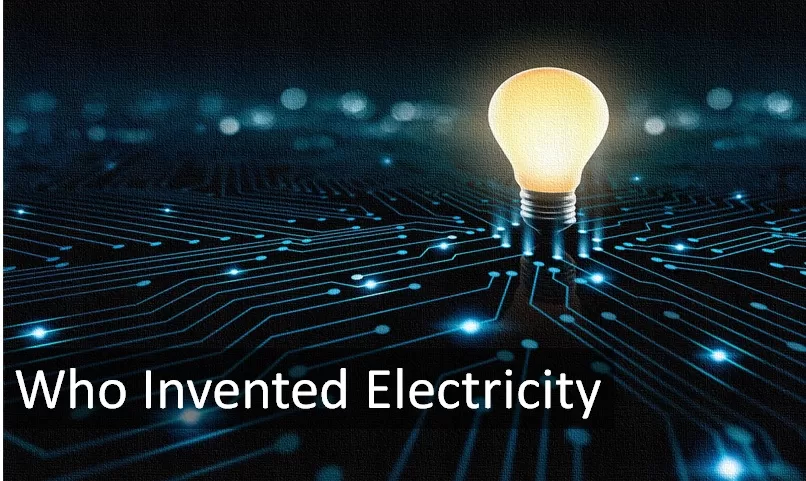Who Invented Electricity? History, Scientists, and Invention of the light bulb made Electricity a household name

It would be more accurate to say ‘who discovered electricity’ instead of ‘who invented electricity’. There were many scientists involved in the discovery of electricity; however the main credit goes to Benjamin Franklin who discovered electricity using a kite-flying experiment in 1752.
Though electricity already existed in the universe, it has to be explored and understood. Where scientists were restricted to static electricity, Benjamin Franklin came up with the idea that electricity has both positive and negative elements.
Further, scientists like Thomas Edison expanded the studies of Benjamin Franklin and came up with his most famous invention- the light bulb.
Discovery Phases of Electricity
Electricity has a long and interesting history. It was not limited to what Benjamin Franklin discovered. People were looking for a cheap and reasonable source to light their homes and scientists’ thoughts, electricity is a good option as it already existed.
However, it was an untouched story, and hence, depth research was required in this field. Scientists started their journey on “how is electricity generated” and moved to “how does electricity work”.
In the initial phase, people were aware of electric fish. They used to refer it as the “Thunderer of the Nile” and consider it a “protector” of all other fish. It was also used to cure ailments like gout or headache.
600 BCE– An ancient Greek pre-Socratic philosopher Thales of Miletus conducted a series of observations referring to static electricity.
Year 1600– An English physician, physicist, and natural philosopher William Gilbert published his scientific work “De Magnete” in 1600. He recognized the connection between magnetism and electricity and elaborated the Earth’s magnetic field.
17th and early 18th centuries– Robert Boyle, Otto von Guericke, Stephen Gray and C. F. du Fay continued the studies on electricity.
Year 1752– An American Scientist Benjamin Franklin conducted a popular kite-flying experiment and proved that lightning is a form of electricity.
Year 1775- A Scottish surgeon John Hunter elaborated the structure of electric organs of the fish.
Year 1791- An Italian physician Luigi Galvani published his work on bioelectromagnetics- the interaction between electromagnetic fields and biological entities. He described
Year 1821- The electric motor was invented by an English Scientist Michael Faraday.
Year 1827: A German physicist and mathematician Georg Simon Ohm analyzed the electrical circuit. He discovered that there is a direct proportionality between the voltage applied across a conductor and electric current and created Ohm’s law.
Late 19th century: Due to the exceptional discoveries of Ottó Bláthy, Alexander Graham Bell, Thomas Edison, Oliver Heaviside, Galileo Ferraris, Ányos Jedlik, Charles Algernon Parsons, Joseph Swan, Werner von Siemens, Reginald Fessenden, George Westinghouse, and Nikola Tesla electricity became a critical tool for modern life.
Year 1905: A German-born theoretical physicist Albert Einstein released a paper on the photoelectric effect. He also bagged the Nobel Prize in Physics for “his discovery of the law of the photoelectric effect” in 1921.
Studies and research are still going on and there are many things that still need to be explored.
Check important GK Questions and Answers
Scientists Involved in the Discovery of Electricity
We have listed only a few in this list, many other scientists already contributed and are contributing their best in the field of electricity.
| Thales of Miletus (c. 626/623-c. 548/545 BC) | He was an Ancient Greek pre-Socratic philosopher. He is also considered the first philosopher in the Greek tradition. |
| William Gilbert (24 May 1544 to 30 November 1603) | He was an English physicist, physician, and natural philosopher. He was also known as Gilberd. |
| Otto von Guericke (November 30, 1602 to May 21, 1686) | A German politician, scientist, and inventor. |
| Robert Boyle (25 January 1627 to 31 December 1691) | People also call him the first modern chemist. He was an Anglo-Irish chemist, natural philosopher, alchemist, physicist, and inventor. |
| Stephen Gray (December 1666 to 7 February 1736) | An English astronomer and dyer. He was the first who experimented on electrical conduction. |
| C. F. du Fay (14 September 1698- 16 July 1739) | He was a French chemist who discovered that there are two types of electricity and he called them as “vitreous” and “resinous”. |
| Benjamin Franklin (January 17, 1706 to April 17, 1790) | An American scientist, inventor, and publisher best known for his kite-flying experiment. |
| John Hunter (13 February 1728 to 16 October 1793) | A Scottish surgeon best known for his various discoveries in the field of surgery and medicine. |
| Luigi Galvani (9 September 1737 to 4 December 1798) | He was an Italian physicist, physician, philosopher, and biologist. He is best known for his studies on animal electricity. |
| Michael Faraday (22 September 1791 to 25 August 1867) | He gave an amazing contribution to the studies of electromagnetism and electrochemistry. He also invented the electric motor in the year 1821. |
| Alexander Graham Bell (March 3, 1847 to August 2, 1922) | An engineer and scientist best-known for inventing the telephone. He was also a co-founder of the American Telephone and Telegraph Company (AT&T). |
| Ottó Bláthy (11 August 1860 to 26 September 1939) | A Hungarian electrical engineer who co-invented the modern electric transformer, motor capacitor, turbo generator, and tension regulator. |
| Thomas Edison (February 11, 1847 to October 18, 1931) | An American businessman and inventor who invented several devices in the field of mass communication, electric power generation, motion pictures, and sound recording. |
| Galileo Ferraris (31 October 1847 to 7 February 1897) | An Italian electrical engineer who invented the induction motor. |
| Oliver Heaviside (18 May 1850 to 3 February 1925) | An English physicist. |
| Ányos Jedlik (11 January 1800 to 13 December 1895) | A Hungarian engineer who is also known as the father of the dynamo and electric motor. |
| Charles Algernon Parsons (13 June 1854 to 11 February 1931) | An Anglo-Irish engineer who invented the compound steam turbine. |
| Werner von Siemens (13 December 1816 to 6 December 1892) | A German electrical engineer who founded electrical and telecommunications conglomerate Siemens. |
| Joseph Swan (31 October 1828 to 27 May 1914) | An English physicist who developed the incandescent light bulb. |
| Reginald Fessenden (October 6, 1866 to July 22, 1932) | He is best known for his foundation of amplitude modulation (AM) radio. |
| Nikola Tesla (10 July 1856 to 7 January 1943) | He is known for his contribution to the modern AC electricity supply system. |
| George Westinghouse (October 6, 1846 to March 12, 1914) | An American Engineer who created railway air brake. |
| Albert Einstein (14 March 1879 to 18 April 1955) | A German-born physicist who developed the theory of relativity. |
Check: How to download electricity bill online?
Journey from Electric Charge to Current
The journey from electric charge to current was never easy. A noted German physicist Otto von Guericke invented the “electrifying machine” using a rotating sulphur ball in 1672 that was able to generate electric charges. He later founded the luminous effect and induction.
After 61 years in 1733, a French scientist Charles du Fray proved the existence of two different charges. The early form of the capacitor was invented by scientists Ewald Georg von Kleist and Pieter van Muschenbroek in 1745 and 1746.
Discovery Phase of Ohm’s Law

Here the term V refers to Voltage, I refers to Current and R refers to Resistance.
The first battery was invented by an Italian physicist and chemist Alessandro Volta in 1800. Later in 1820, a French physicist and mathematician discovered the major influence of magnets and electromagnetism.
In 1826, a German physicist and mathematician Georg Simon Ohm discovered the connection between voltage, current, and resistance and created Ohm’s Law.
Details about National Energy Conservation Day
Invention of the light bulb made Electricity a household name
Electricity finally entered private households with the invention of the carbon-filament light bulb by Thomas Alva Edison in 1880. Since then, the world has witnessed the fastest growth of electrical devices.
FAQs
Most people give credit to Benjamin Franklin.
Year 1752
There are many technologies used and it also includes solar thermal energy, hydro turbines, gas turbines, solar photovoltaics, and wind turbines.
Benjamin Franklin




